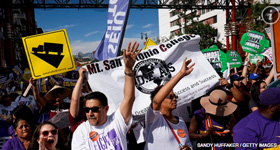Published in Aljazeera America May 29, 2015
Unions Divide Labor Movement Over LA Minimum Wage Exemptions
Proposal to waive minimum wage for unionized shops divides labor activists and supporters
by Ned Resnikoff
 Unions fought for the recently passed $15 minimum wage in Los Angeles. Now they’re asking that it not apply to their members, exposing a fault line in the labor movement.
Unions fought for the recently passed $15 minimum wage in Los Angeles. Now they’re asking that it not apply to their members, exposing a fault line in the labor movement.
The executive secretary-treasurer for the Los Angeles County Federation of Labor — a local affiliate of the AFL-CIO, America’s biggest labor federation — said Tuesday that the new minimum wage law should not pertain to workers covered by a union collective bargaining agreement.
“For every local wage ordinance it has ever adopted, the Los Angeles City Council has respected agreements that businesses and employees have mutually reached,” said Federation of Labor spokesman Rusty Hicks, who is also a leader in the Los Angeles Raise the Wage coalition, in a statement. “LA should continue to do what other cities in California have done when raising its minimum wage.”
In a clarifying statement released Thursday night, Hicks said, "Raise the Wage stands with the City Council and supports the minimum wage ordinance as currently drafted." Though he reaffirmed his support for the “collective bargaining supersession clause,” as he referred to it, he suggested that it could be considered separately from the wage bill as it currently stands.
“I recognize it needs additional time for debate in front of lawmakers and the public and I support that,” said Hicks in the statement.
The request for a collective bargaining exemption has created a rift among activists and supporters of organized labor, many of whom say that all workplaces should be subject to the new minimum wage requirement.
One of the lead organizers involved in the high-profile fast food workers’ campaign said his organization opposes any measure that could “undermine” a $15 base wage for all workers.
“We support $15 an hour as a minimum wage for all workers — in LA and everywhere — and don’t support anything that could undermine that,” said Fight For $15 organizing director Kendall Fells in a statement to Al Jazeera.
Recent wage hikes in other cities have included similar exemptions for unionized businesses. Those cities include San Francisco, which has also signed off on a $15 minimum wage law, and Chicago, which in December approved a $13 minimum wage bill.
The U.S. Chamber of Commerce, in a 2014 report on so-called union “escape clauses,” argued that such language is “often designed to encourage unionization by making a labor union the potential ‘low-cost’ alternative to new wage mandates.”
Seattle University School of Law professor Charlotte Garden told Al Jazeera that escape clauses might also allow unions to negotiate “a more dynamic package of wages and benefits, where total compensation might be higher than the minimum wage, even if the contract wage is somewhat lower.“
“Even with the carve-out, unions will still be negotiating for wage increases with each contract, but some bargaining units might decide their best interests lie in other forms of compensation as well,” said Garden.
University of Rhode Island labor historian Erik Loomis said that logic is unlikely to carry much weight with the non-union workers that Los Angeles unions may attempt to organize in the future.
Although those workers might be attracted to promises of better health and pension benefits, “the first question people are probably going to be asking about a union is, ‘are we going to make more money out of it?’” he said.
“The optics of it are just awful,” Loomis said. “What this looks like is a really, very poorly thought out idea that makes organized labor look like not an ally to the average worker."
The optics may be particularly awkward for the labor movement’s national institutions, which have spent the past few years attempting to position themselves as advocates for the entire working class, not just their memberships. The AFL-CIO has been a vocal supporter of both immigrant justice groups and the Black Lives Matter protests. Offering employers an exemption to minimum wage laws if they agree to unionize could undermine those alliances, said Loomis.
“I think a lot of progressive organizations were already a little nervous about allying with labor unions, because unions have really struggled to prove themselves to be valuable allies on the ground,” he said. “And this just reinforces that belief."
Seattle was among the first cities to pass a $15 minimum wage law; their legislation included no opt-out provision.
“I would say we are extremely skeptical of collective bargaining opt-outs,” said Philip Locker, spokesman for the Seattle-based group $15 Now, which helped lead the charge for the city’s minimum wage hike. However, he said it was at least possible that opt-outs could be of some benefit to workers who want more flexibility in negotiating wages and benefits.
“The key thing is that the issue should be decided by the workers and union activists in Los Angeles,” said Locker. “They are the ones in the best position to determine whether a collective bargaining opt-out would strengthen their hand or weaken their hand.”
Los Angeles Mayor Eric Garcetti told reporters Wednesday that he had not yet made a decision on whether to support the exemption in Los Angeles.